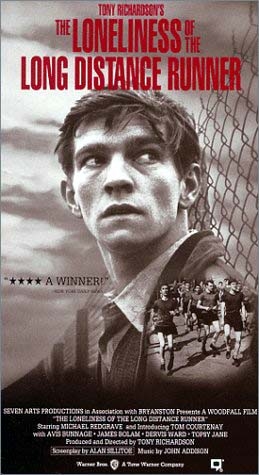|
The protagonist Colin Smith (played by Tom Courtenay in his breakout role), an inmate doing time at Ruxton Towers, a detention center, is winning a five mile cross country race, way ahead of the pack, in a track meet between Ruxton Towers and Ranley, a nearby upper class school for privileged students.
It's 100% certain he'll come in first. Victory for Ruxton Towers and pride for the warden is assured. Yet inexplicably to his incredulous Ruxton Towers fellow inmates and the warden watching the race madly cheering him on, he slows down then comes to a complete stop, mere yards from the finish line, looking directly at the warden, a look of dead calm on his face. A Ranley runner passes him to win.
Colin doesn't stop running because he can't run any more. On the contrary, cross country running is in his blood. It's what gives him Life. He doesn't stop running because he's tired or injured. He stops running because he's discovered integrity. He stops running because he can no longer be coerced with favors and kickbacks from the warden in return for winning and bringing glory to Ruxton Towers. He stops running because even though he'll lose his privileges (indeed, even though he knows he'll be punished) for throwing the race so dramatically, he can no longer run let alone win when it's costing him himSelf.
He's taken back to the detention center, back to a life now devoid of the erstwhile privileges which the promise of his winning earned him. Indeed, he goes back to a life in confinement with even fewer comforts than he had before, back to a life scorned by his fellow inmates and ignored by the warden. Yet he goes back with his integrity renewed and his honor intact. He goes back with who he really is established.
Regardless of his circumstances, or rather in the midst of them, even in spite of them, for the first time in his troubled life he has authentic completion and peace.
That's who Colin is.
